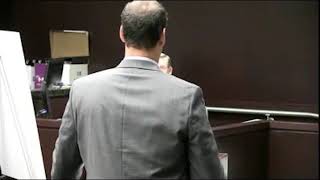

The Expert: Dr. Michael Conner, pathologist at the University of Alabama-Birmingham, testifies for the defense as to the defendant pathologist’s study and reporting of lab findings.

Dr. Michael Conner, a pathologist affiliated with the University of Alabama-Birmingham, testifies in a 2019 Florida medical malpractice trial that revolved around the communication between two obstetricians and a pathologist about an ectopic pregnancy. Conner is both an anatomical and clinical pathology specialist, and he differentiates this for the court. Anatomical pathology concerns the examination of the parts of the human body submitted by a treating physician, while clinical pathology concerns the laboratory testing of submitted body fluids of patients.
The plaintiff claims that inappropriate communication on test results caused a delay in treatment for a woman with an ectopic pregnancy. The pathologist involved had examined the uterine lining. The specimen was submitted on a Friday and the processed slides were read on Monday. Within one hour of that determination, the defendant pathologist had contacted the gynecologist. The expert testifies with emphasis that this is entirely within the standard of care for pathologists. He endorses that the actions were timely and accurate according to his review.
According to Conner, unless the submitting physician asks for a pathologist to call regarding anatomical pathology, it is not within the standard of care to make that call. This is in contrast to a “frozen section” analysis where a specimen is sent to the pathologist for an immediate reading. With a frozen section, the pathologist is frequently in contact with the submitting surgeon within 20 minutes of the submission.
Clinical pathology, on the other hand, demands immediate communication in cases when the laboratory values demonstrate a critical number, or “panic” value that should be addressed as soon as possible. A phone call or some means of immediate communication is the standard of care under these circumstances. This case involved an anatomical pathology evaluation, so a phone call was not expected absent a request by the treating physician.
The expert testifies that on his examination of the pathology slides, the uterine lining was lush, or “juicy” as he puts it. This occurs under the influence of hormones, produced to make the uterus more conducive to maintaining the pregnancy. An Arias-Stella reaction was noted by the defendant pathologist. This is a benign change in the endometrium, or mother’s uterine lining, that is associated with the presence of fetal tissue [pregnancy]. The chorion is the outermost fetal membrane around the embryo. The chorionic villi of the fetal placenta are projections from this chorion into the endometrium, which allows the fetus to access the mother’s blood stream. This intersection occurs in the placenta. The Arias-Stella phenomenon occurs in the presence of the products of conception, so it indicates that there is a pregnancy somewhere. In this case, there was an Arias-Stella reaction without the presence of chorionic villi. That indicates that either the patient had a recent miscarriage [abortion] and the products of conception have passed out of the uterus, she has a tumor producing the hormones, or she was pregnant with an ectopic pregnancy. This would be a pregnancy that implanted somewhere other than the uterus.
The defendant, knowing that this was a possibility, included ectopic pregnancy in his differential diagnosis, and emphasizing its importance on that list, he stated that this condition must be ruled out. The expert evaluated the defendant’s adherence to the standard of care and “gave him an A+”. The testifying doctor states that in his over 40 years of practice, he has never heard of the standard of care demanding that the pathologist be required to call anyone under these circumstances. He enters his findings into the hospital’s electronic system, and immediately, that information is disseminated and available to anyone treating this patient. Even before the electronic system was available, “There has never been a standard of care in anatomic pathology, that says that you have to pick up the phone and talk to anybody,” explains the expert. If the surgeon needs to know immediately what the pathology is, it is the surgeon that initiates the call, asks for a frozen section report, or asks that a phone call be made as soon as the pathological findings are known. The pathologist does not try to guess when it is important to call.
Essentially, there are several things that can cause the findings that were reported. The pathologist does not know what the surgeon is worried about unless that surgeon informs him. He will assume the case is routine unless he is told otherwise, and specifically informed of such by the operating physician.
The verdict in this case was for the defense based on this testimony.
Gary Gansar, MD, is residency-trained in general surgery. He served as Chief of Surgery and Staff at Elmwood Medical Center and on the Medical Executive Committee at Touro Infirmary and Mercy Hospital in New Orleans, LA. Dr. Gansar was Board Certified in general surgery while in active practice. He joined AMFS in 2015 as a Physician Medical Director.
The medical expert witness partner for attorneys serious about building a winning case
AMFS is your trusted source for highly-qualified medical expert witnesses. After pioneering the field nearly three decades ago, we’re continuing to redefine medical expert witness services by providing value far beyond a referral alone.
Our Physician Medical Directors know what it takes to build a strong case. Our medical expert witnesses leave no doubt. And our case managers streamline billing and logistics every step of the way, letting you focus on what you do best: constructing your winning case. Explore why AMFS clients expect more from their medical expert witnesses—and get it.
